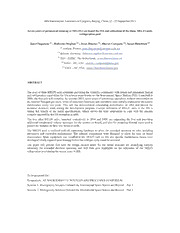
NASA Technical Reports Server (NTRS) 20130011262: Seven Years of Permanent Running of MELFI-1 on Board the ISS and Utilisation of the Three MELFI Units Refrigeration Pool PDF
Preview NASA Technical Reports Server (NTRS) 20130011262: Seven Years of Permanent Running of MELFI-1 on Board the ISS and Utilisation of the Three MELFI Units Refrigeration Pool
64th International Astronautical Congress; Beijing, China; 23 - 27 September 2013 Seven years of permanent running of MELFI-1 on board the ISS and utilisation of the three MELFI units refrigeration pool Jean Cheganças (1) ; Hubertus Stephan (2) ; Jesus Jimenez (3); Sharon Campana (4); Susan Hutchison (5) (1) Astrium, France, [email protected] (2)Astrium, Germany, [email protected] (3) ESA - ESTEC, The Netherlands, [email protected] (4) NASA - JSC, USA, [email protected] (5)NASA - JSC, USA, [email protected] ABSTRACT The pool of three MELFI units continues providing the scientific community with robust and permanent freezer and refrigeration capabilities for life science experiments on the International Space Station (ISS). Launched in 2006, the first unit will complete, by summer 2013, seven years of continuous operations without intervention on the internal Nitrogen gas cycle, while all necessary hardware and operations were initially planned for preventive maintenance every two years. This unit has demonstrated outstanding performance on orbit and proved the technical decisions made during the development program. Current utilization of MELFI units in the ISS is taking full benefit of the initial specifications, which allows for wide adaptations to cope with the mission scenario imposed by the life extension in orbit. The two other MELFI units, launched respectively in 2008 and 2009, are supporting the first unit providing additional conditioned volume necessary for the science on board, and also for preparing thermal mass used to protect the samples on their way down to earth. The MELFI pool is outfitted with all supporting hardware to allow for extended operation on orbit including preventive and corrective maintenance. The internal components were designed to allow for easy on board maintenance. Spare equipment was installed in the MELFI rack on ISS and specific maintenance means were developed which required crew training before the cold gas cycle could be accessed. The paper will present first how the design choices made for the initial missions are identifying features necessary for extended duration missions, and will then give highlights on the utilization of the MELFI refrigeration pool during the recent years in ISS. To be proposed for : Symposium : A2. MICROGRAVITY SCIENCES AND PROCESSES SYMPOSIUM Session: 6. Microgravity Sciences Onboard the International Space Station and Beyond – Part 1 Session: 7. Microgravity Sciences Onboard the International Space Station and Beyond – Part 2
